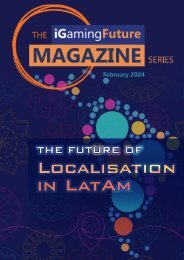Create successful ePaper yourself
Turn your PDF publications into a flip-book with our unique Google optimized e-Paper software.
MARKET OVERVIEW<br />
According to GSMA, the gross gaming revenue (GGR) <strong>of</strong> the<br />
LatAm betting sector is predicted to nearly triple between 2020<br />
and 2025, peaking at over US$3 billion.<br />
At this singular moment in time, as we launch<br />
a new year, it’s hard to ignore the amazing<br />
growth potential available within the Latin<br />
American market.<br />
<strong>The</strong> biggest drivers for this growth stem<br />
from the increased access to technology,<br />
with smartphone penetration, alone, expected<br />
to hit 73 per cent by 2025. This, alongside<br />
recent regulatory changes, has created fertile<br />
ground for i<strong>Gaming</strong> expansion.<br />
But operators still need access to the right<br />
products in order to fulfill the dynamic needs<br />
<strong>of</strong> Latin American players – and achieve real<br />
and lasting success.<br />
Brazil, with a population <strong>of</strong> over 214 million<br />
people, is potentially Latin America’s largest<br />
market. Within the i<strong>Gaming</strong> community it’s<br />
<strong>of</strong>ten called a sleeping giant. Once its<br />
pending regulations come into effect, the nation<br />
will have the continent’s largest online sports<br />
betting market, expected to be worth over US$1<br />
billion-a-year..<br />
In addition, other growth regions – notably<br />
Colombia, Mexico, Argentina and Peru – also<br />
<strong>of</strong>fer operators a fantastic opportunity for<br />
expansion.<br />
But a word <strong>of</strong> caution:<br />
Each country in the continental<br />
tapestry has its own market<br />
nuances. So product<br />
adaptability is key.<br />
Understanding how to successfully navigate<br />
these newly-regulated territories – while<br />
tackling issues <strong>of</strong> localisation, delivering an<br />
Omnichannel experience and harnessing<br />
convenient payment methods – is key to<br />
securing your market share.<br />
Regulation in the region is<br />
continually evolving, especially<br />
in some <strong>of</strong> the most promising<br />
LatAm markets, like Brazil.<br />
THIS IS WHY i<strong>Gaming</strong><strong>Future</strong> has caught up<br />
with some <strong>of</strong> the most experienced operational<br />
leaders from the Latin American market<br />
– to deliver top-flight insight into what it really takes<br />
to achieve success in this sector.<br />
This is a great opportunity to get an authentic, insider<br />
understanding <strong>of</strong> the product-related challenges<br />
present in the region, and, importantly, to gauge the<br />
most effective solutions going forward.<br />
Curtis Roach<br />
Head <strong>of</strong> Content<br />
iGF
Juan José Mantese<br />
Head <strong>of</strong> LatAm<br />
OUR EXPERT SPEAKERS<br />
MeridianBet<br />
Thomas Carvalhaes<br />
Managing Director<br />
VaiDeBob<br />
Jack Smith<br />
Sales Director<br />
Sportingtech<br />
4
INDUSTRY INSIGHTS<br />
As the market landscape evolves and adapts to new trends,<br />
our industry has now been compelled to react accordingly.<br />
In this section we hear from our expert<br />
and locally experienced panel, who take an<br />
in-depth view <strong>of</strong> the regulatory outlook<br />
in LatAm to help you overcome these<br />
challenges, ensuring a successful product<br />
launch and significant market share.<br />
CONTENTS<br />
6<br />
Q+A<br />
with all our Expert Speakers<br />
12 Editor’s Conclusion<br />
5
LatAm has traditionally been a largely retail-based<br />
market. Now that online is coming to the fore, how do<br />
you see these two channels working side-by-side and<br />
complimenting each other?<br />
Q+A<br />
Thomas<br />
In order to do my best [in<br />
answering this] I need to<br />
break it down to specific<br />
markets. So let me start with<br />
Brazil.<br />
As we know, when it<br />
comes to land-based<br />
gaming in Brazil, we are<br />
very restricted.<br />
As it stands, sports betting is<br />
considered legal. However,<br />
you barely see any landbased<br />
sports betting shops.<br />
However, if you travel to the<br />
northeast <strong>of</strong> the country,<br />
you see them popping up<br />
everywhere.<br />
If you look at the mobile<br />
penetration in Brazil right<br />
now, they are one <strong>of</strong> the<br />
most advanced, in terms<br />
<strong>of</strong> mobile penetration, in<br />
Latin America.<br />
Right now, Brazil has more<br />
than 75 per cent <strong>of</strong> the<br />
population with access to the<br />
web via a mobile device. <strong>The</strong><br />
lowest percentage <strong>of</strong> that [is]<br />
in northeast Brazil. For you to<br />
establish your online presence<br />
there, you need to set up shop<br />
first in order to then convert<br />
your customers over to an<br />
online betting experience.<br />
6<br />
However, if you look at the<br />
southern areas <strong>of</strong> Brazil, for<br />
example, Sao Paulo, Santa<br />
Catarina and other states, the<br />
population seems to have a<br />
lot more access to online<br />
betting sites. It’s much [rarer]<br />
to see a betting shop in these<br />
areas.<br />
Brazil doesn’t have any<br />
legal land-based casinos<br />
right now. So, I think the<br />
linking <strong>of</strong> land-based<br />
and online, <strong>of</strong> course, is<br />
extremely important.<br />
Especially in a country like<br />
Brazil, where people are very<br />
much used to going physically<br />
to a shop or to a bank to get<br />
things done.<br />
Jack<br />
Some <strong>of</strong> the operators we<br />
work with are in the regions<br />
where it is more heavily<br />
retail-focused.<br />
As a B2B supplier, our main<br />
focus becomes how to help our<br />
partners move their customers<br />
online. If you go back as far as<br />
three-years-ago, when Covid<br />
first happened, everyone<br />
made an emphasis [on]<br />
digitalisation and creating an<br />
‘armchair’ experience for the<br />
greatest convenience <strong>of</strong> their<br />
players.<br />
You can do everything by<br />
your phone now, which<br />
obviously comes with<br />
huge benefits because<br />
it means that you can<br />
penetrate the market in a<br />
more effective way.<br />
Players no longer have to go<br />
to a physical point <strong>of</strong> sale,<br />
but you must be careful not<br />
to cannibalise your own<br />
business.<br />
We are more interested<br />
in providing solutions<br />
that enable you to crosssell,<br />
and ensure that both<br />
channels still have a<br />
huge importance for the<br />
business.
For example, we have a feature<br />
in-built within our products<br />
that allows players to log on<br />
to the mobile site, or on to the<br />
desktop site. From there they<br />
will be able to put their bet<br />
together, book the bet and<br />
then they’ll receive a QR code<br />
that they can actually take to<br />
a physical point <strong>of</strong> sale and<br />
complete that bet in cash.<br />
Juan<br />
When I started in 2012, the<br />
only thing we were speaking<br />
about was retail. <strong>The</strong>re<br />
were still some big online<br />
operators around. But the<br />
people, in my opinion, were<br />
not prepared.<br />
What changed everything<br />
was the Pandemic. Before<br />
Corona, I would say LatAm<br />
was 10-years behind<br />
Europe, but the impact <strong>of</strong><br />
lockdown has driven this<br />
gap down to just fiveyears<br />
now.<br />
In countries like Mexico, we<br />
started with retail inside<br />
some land-based casinos.<br />
Unfortunately, Colombian<br />
regulation only allowed the<br />
retail shop to be used for<br />
deposits and withdrawals.<br />
You were not able to actually<br />
place a bet in the shop. So, in<br />
Colombia, you have a funny<br />
model where you have shops<br />
full <strong>of</strong> computers, where the<br />
people log in and play there.<br />
I don’t see a huge<br />
strength in this retail<br />
model for most LatAm<br />
countries, whether they’re<br />
trying to regulate it or not.<br />
7
Payments are a key part <strong>of</strong> any successful operation.<br />
What are the best payment solutions for the region?<br />
What are the associated challenges with payment<br />
solution integration?<br />
I think this is still something<br />
that is not fluid, and we<br />
are still experiencing<br />
bottlenecks. I haven’t come<br />
across a payment aggregator<br />
yet that has a proper solution<br />
for this.<br />
8<br />
Juan<br />
What I see as the biggest<br />
challenge nowadays is the<br />
withdrawals.<br />
<strong>The</strong> other main issue that<br />
I find in my operation<br />
is fraud. But all-in-all,<br />
in the last three-years,<br />
payments have improved<br />
exponentially.<br />
And I think that in the<br />
different markets, you<br />
can find proper solutions<br />
to maintain a high-level<br />
customer experience for<br />
the players. We still need to<br />
improve a lot, but I don’t feel<br />
that we are [currently] in a bad<br />
position.<br />
Jack<br />
As a B2B platform provider,<br />
we are currently operating<br />
in multiple continents. At the<br />
moment we have upwards<br />
<strong>of</strong> the high hundreds in<br />
regard to the number <strong>of</strong><br />
PSPs that are integrated, as<br />
each territory brings its own<br />
demands.<br />
In Brazil the PIX platform<br />
was a huge game changer.<br />
It’s been around for just<br />
over two-years now, but<br />
the ability to be able to<br />
tap into a certain area<br />
<strong>of</strong> the market and give<br />
people access to move<br />
money around freely is a<br />
significant step forward.<br />
From our perspective, we<br />
see PSPs as a unique selling<br />
point.<br />
Thomas<br />
We Brazilians are very<br />
proud <strong>of</strong> PIX because it<br />
has, to a certain extent,<br />
revolutionised the speed<br />
at which we can make<br />
financial transactions,<br />
bank-to-bank, CPF to CPF<br />
account.<br />
We used to have instant bank<br />
transfers, but they were not<br />
that instant! We had Boleto<br />
as well, which was a bit <strong>of</strong><br />
a nightmare for customers<br />
and for us when it came to<br />
settlements, fraud, processing<br />
times, etc.<br />
Many other Latin American<br />
countries are hoping<br />
to copy the PIX model.<br />
However, I don’t know how<br />
many <strong>of</strong> them are familiar<br />
with alternative payment<br />
solutions, such as MPesa from<br />
Africa.<br />
<strong>The</strong>y’ve been running<br />
instant payments for almost<br />
10-years now in regions such<br />
as Tanzania, Kenya and South<br />
Africa. <strong>The</strong>y all use the MPesa<br />
system, which is very similar<br />
to PIX but even better, in my<br />
opinion.<br />
I know we’re analyzing Latin<br />
America, but, just putting<br />
this into perspective, Covid<br />
brought a tech benefit<br />
to [both] Brazil and Latin<br />
America, [and] at the same<br />
time, I think sometimes<br />
we forget to bring some<br />
African and Asian markets<br />
into the equation.
Being a relatively new market, industry standards may<br />
still need improving – even if customers’ expectations<br />
aren’t very high, compared to more established regions<br />
like Europe.<br />
Why is it so important to set new industry benchmarks<br />
in Latin America, and how do you go about doing this?<br />
Jack<br />
If you look at other<br />
continents, such as North<br />
America, they very much<br />
embraced the European way<br />
<strong>of</strong> doing things in regard<br />
to customer experience<br />
standards, etc. European<br />
operators rushed to be first<br />
to market, and put their stamp<br />
on the market.<br />
Latin America is far less<br />
accepting <strong>of</strong> something<br />
that doesn’t necessarily<br />
cater to their specific<br />
needs and demands.<br />
If you give the operator<br />
the flexibility and the<br />
technical ability to be able<br />
to create something using<br />
their local knowledge,<br />
then you can create quite<br />
an exciting proposition<br />
for the player, whether<br />
it be certain verticals, or<br />
certain PSPs [that are]<br />
integrated [and] act as<br />
triggers to engage players.<br />
I think that’s why we’re now<br />
starting to see some <strong>of</strong> the<br />
maybe lesser established<br />
localised operators, who have<br />
been able to jump onto some<br />
enhanced technology, making<br />
great strides to overtake<br />
some <strong>of</strong> the larger operators.<br />
Juan<br />
<strong>The</strong> main thing that we<br />
can compare to Europe is<br />
football. If you see statistics,<br />
bets on football represent<br />
90 per cent <strong>of</strong> all bets made.<br />
That is pretty similar to our<br />
model. I think players started<br />
with really basic bets, but<br />
now players are starting to<br />
combine and now you have<br />
Bet Builder and I think there is<br />
a path that is trying to follow<br />
Europe. <strong>The</strong> big difference<br />
I see is that when [European<br />
operators] come to the<br />
region, they come with big<br />
wallets and they have strong<br />
brands, but they continue<br />
using their technology or<br />
their platform from Europe.<br />
<strong>The</strong>re is a gap here because<br />
it’s clear that if you want<br />
to use the same platform<br />
you use in other markets<br />
in Latin America, for sure, it<br />
will not work.<br />
Thomas<br />
We’re usually not taken<br />
very seriously when we<br />
say LatAm is different, or<br />
Brazil is different.<br />
I’ve seen instances where<br />
a giant European operator<br />
has not adapted and [so has<br />
subsequently] died. This has<br />
happened time and time again<br />
because people are stubborn,<br />
and people are not willing<br />
to adapt their strategies to<br />
the local markets they’re<br />
targeting.<br />
How do you know if your<br />
strategy is going to become<br />
a benchmark? I think a<br />
benchmark cannot be created.<br />
<strong>The</strong> target audience are<br />
the ones who provide these<br />
inputs and insights for what<br />
becomes the benchmark.<br />
We need to be willing<br />
to listen to our target<br />
audience and adapt our<br />
strategies accordingly.<br />
9
Can you comment on the current state <strong>of</strong> regulation<br />
across LatAm. What are your thoughts on recent<br />
regulatory updates and what countries will be next to<br />
go live?<br />
Thomas<br />
I think trying to copy a<br />
model <strong>of</strong> a country, such<br />
as the United States, into<br />
countries like Brazil and<br />
Argentina is a recipe<br />
for failure, because<br />
we just don’t have the<br />
infrastructure.<br />
We don’t have the logistical<br />
support. And we don’t have<br />
the IT support to make sure<br />
it works. Now, at this point,<br />
10<br />
what we have in our hands for<br />
Brazil is a presidential decree<br />
that has legalised sports<br />
betting and games <strong>of</strong> skills,<br />
such as poker. However, when<br />
it comes to sports betting,<br />
we’re still waiting for a final<br />
piece <strong>of</strong> regulation to be<br />
approved and enforced.<br />
When it comes to gambling,<br />
it’s still completely deemed<br />
as forbidden. We as<br />
operators look at this with a<br />
lot <strong>of</strong> frustration because it’s<br />
a massive market. At the<br />
same time, I need to say<br />
that it’s better that people<br />
[should] know how to do it:<br />
the agencies, the regulating<br />
boards, departments <strong>of</strong> state,<br />
or the politicians.<br />
I would prefer having<br />
people [who] really<br />
understand and know<br />
what [it’s about] to<br />
regulate – rather than<br />
rush to a final piece <strong>of</strong><br />
regulation that will<br />
encourage a [bad] market<br />
to grow instead.<br />
Which was the case in<br />
Europe, Portugal particularly,<br />
where the regulation wasn’t<br />
very well thought through. We<br />
saw this in Mexico as well.<br />
Mexico calls [itself] regulated.<br />
But I know there’s many<br />
operators in Mexico with a<br />
‘.com’ site, and they can’t be<br />
stopped because they just<br />
pop-up literally overnight. This<br />
is unfair to those with a ‘.mx’<br />
domain, paying their taxes, and<br />
doing the right thing, as per<br />
the regulation.<br />
At this stage, as much as<br />
I am waiting anxiously for<br />
the regulation in Brazil, I<br />
also prefer waiting for the<br />
right regulation to come<br />
about, meaning [it will<br />
be] fair for the businesses<br />
and for the players in the<br />
country.
Jack<br />
For us, obviously our<br />
compliance team is<br />
expanding all the time.<br />
We’re completely engaged in<br />
the multitude <strong>of</strong> regulatory<br />
changes that we’re expecting<br />
to come up in the next six-to-<br />
12-months.<br />
If you consider the earlier<br />
points made about<br />
creating benchmarks<br />
and learning from other<br />
regulated countries, that’s<br />
something that I think<br />
these countries can lean<br />
on.<br />
Obviously, the US is very<br />
stringent and perhaps [it] isn’t<br />
the way that people want to<br />
go. But we’ve got a global<br />
market here, where there are<br />
many regulated markets and<br />
some <strong>of</strong> them work very well.<br />
I certainly believe that there<br />
are aspects, or maybe<br />
certain factors, that some<br />
<strong>of</strong> these countries should<br />
be looking at and seeing<br />
what works and perhaps<br />
what doesn’t work, then<br />
implementing them in a<br />
fair way.<br />
In Colombia, they’ve gone<br />
down a route where things<br />
have been made very difficult<br />
for the local operator.<br />
I think you need to create<br />
a fair regulation that<br />
allows [local] businesses<br />
to thrive.<br />
Colombia, where it’s so<br />
expensive, is now a market<br />
where you would say<br />
it’s easier for companies<br />
with money. European<br />
heavyweights can now easily<br />
tap into it because they’re<br />
happy to come with a huge<br />
bank role and spend the<br />
necessary money.<br />
We’ve now ended up with an<br />
influx <strong>of</strong> European operators<br />
[that potentially could<br />
dominate] the market. You are<br />
then essentially ruling out<br />
the opportunity for creating<br />
local companies that can<br />
give back to the community,<br />
in the way that some <strong>of</strong> the<br />
lotteries operate in Europe and<br />
around the world.<br />
11
EDITOR’S CONCLUSION<br />
After hearing the panel’s insights,<br />
it’s clear that in order to achieve<br />
successful penetration into<br />
multiple LatAm markets, product<br />
adaptability is essential.<br />
Finding the balance between retail and<br />
online has proven a tricky path for many<br />
operators, but with the recent influence <strong>of</strong><br />
new payments platforms, localised content<br />
providers and improved regulation, there<br />
seems to be a clear way forward to achieve<br />
growth in this sector.<br />
Countries like Brazil <strong>of</strong>fer so many<br />
opportunities for growth, but being such a<br />
relatively young i<strong>Gaming</strong> market that is yet to<br />
fully establish itself means that operators must<br />
Being able to rely on<br />
an experienced platform<br />
provider will give<br />
operators the confidence<br />
they need to successfully<br />
enter this jurisdiction<br />
and others like it.<br />
Taking advantage <strong>of</strong> country specific<br />
solutions, such as the Pix payments, will<br />
be a major advantage, but it’s even more<br />
important to look at how<br />
other emerging markets<br />
are developing.<br />
12<br />
be flexible and aware that the landscape<br />
can change at any moment. <strong>The</strong>se changes<br />
will have a direct impact on the product<br />
demands, creating difficulties, especially when<br />
operating at scale.<br />
Looking at solutions like Mpesa in east Africa,<br />
is a great example <strong>of</strong> what can be learned<br />
from other regions to help operators<br />
reach their full potential and engage a<br />
larger audience who value convenience over<br />
everything.<br />
Market conditions are<br />
largely dependent on<br />
new regulations being<br />
introduced, but it can<br />
be a challenge to keep<br />
your processes and most<br />
importantly, your products<br />
up to date. Focusing on<br />
this internally and maybe<br />
even making use <strong>of</strong> the<br />
extensive compliance<br />
services <strong>of</strong>fered by<br />
solutions providers, such<br />
as SportingTech, will be<br />
pivotal to omni-channel<br />
success in Latin America.
2022<br />
Rising Star<br />
<strong>of</strong> the Year<br />
2022<br />
Rising Star in<br />
Sport Betting<br />
S<strong>of</strong>tware<br />
WIN LATAM WITH OUR SPORTSBOOK<br />
Did you know? By 2026, i<strong>Gaming</strong> revenue in Latin America will reach<br />
USD 4.4 billion. Get the most out <strong>of</strong> Latin America with Uplatform -<br />
sports betting and casino operating platform.<br />
We will help you to connect authentically with your players and grow<br />
your brand using proven localization solutions that deliver results.<br />
Extensive football<br />
coverage<br />
Regionalised<br />
content<br />
Global and local<br />
payment metods<br />
START NOW

















